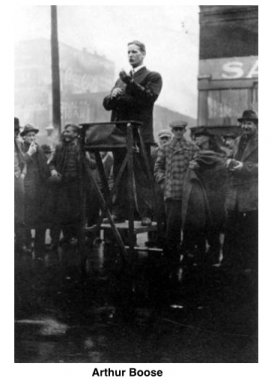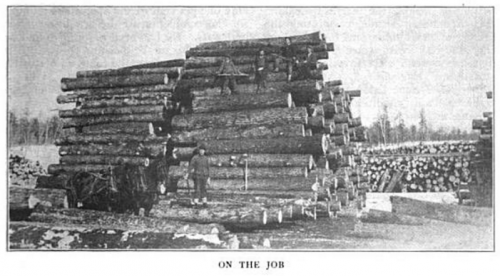Hellraisers Journal: "The Lumber Jack" by Arthur Boose, IWW Organizer in Northern Minnesota
Put on your fighting clothes.
-Mother Jones
~~~~~~~~~~~~~~~~~~~~~~~~~~~~~~~~~~~~~~~~~~~~~~~~~~~~~~~~~~~~~~~~~~~~~~~~~~~~~
Saturday January 1, 1916
From the International Socialist Review: Arthur Boose on Organizing Lumber Jacks
From this month's edition of the Review we offer an article by Arthur Boose who is currently engaged in the organizing effort of the Industrial Workers of the World amongst the Timber Workers of Northern Minnesota.
THE LUMBER JACK
By ARTHUR BOOSEI HAVE been asked to contribute an article on the lumber industry and the conditions which obtain in it. I have spent a good deal of my life in that industry and take pleasure in telling about the life of the men known as lumber jacks.
I have often made the assertion that they are most submissive slaves. They put me in mind of what Joe Hill said of the Scissor Bill. They look like human beings physically, but they think like children. To prove this statement all that is necessary is to look over the conditions of the various industries of the country. We find that the conditions are worse and the wages lowest in the lumber industry. Last winter many lumber jacks got only $10 a month and $26 was top wages.
At the present writing in this city (Duluth, Minn.), while the employers are howling about the prosperity and scarcity of labor in the country, the employment sharks are hiring men for $18 to $30 a month for the lumber companies. What do you think of this kind of prosperity?
And when they are on the job, at about 4:30 in the morning the horn is blown which tells the men to get ready for flap jacks and watery coffee. Then they are turned out in the dark to work long before sunrise. They are in the woods and snow, working, shivering and waiting for daylight.
The bunk houses in which the lumber jacks sleep are enough to gag a skunk. Men lie all night piled together like sardines in a box. Sometimes they sleep on the floor, when there are not bunks enough for all.
There are usually two tiers of bunks, one on each side of the camp. Sometimes the bunks are built of poles, with hay or balsam boughs in them for the men to sleep on. In one camp I saw men buying hay to sleep on. Otherwise they would have to do without. The lumber company sold hay to the men for beds at the rate of three cents a pound. Some of this hay was sold over and over again. When someone quit work or got fired and left his hay in the bunk, the chore boy, better known as the Bull Cook, would gather up the hay and sell it to someone else that came along. And every time this hay was sold it weighed more, because it was filled with more vermin and dirt. Beans and sow-belly are the chief food.
To keep clean is impossible in a lumber camp. Baths and other sanitary conveniences are entirely out of the question. The only bath the lumber jacks get is when they are caught out in the rain. In most camps they get their dinners out in the woods. In cold weather the knife and fork would stick to their mouths. The food would be cold and sometimes frozen-not fit for pigs to eat. If thrown at a hog, I am firmly convinced he would grunt because it hit him. But watching some of the lumber jacks dig into that garbage, it seems they like it and thank God it isn't worse.
In very nearly all camps they must buy their jobs or they can't get on, because the lumber companies get their men through the employment agencies, because that is a good paying proposition for the lumber companies as well as the employment sharks. They divide this money which the men pay for jobs fifty-fifty, or, in other words, the sharks take half for hiring them and the lumber companies take the other half for firing them. But it seems most of the lumber jacks like this system of getting a job, because they keep this up. When they get fired on the job they come right back to the city and buy another job, and can't understand why they must produce an employment ticket or be idle.
They ought to know it is bad enough when men have to run around in a "free country," full of prosperity, as they call it, begging for work, let alone buying a job. In many camps they must pay hospital fees, which are about a dollar a month, and ten to twenty-five cents a month to get their mail. They are often twenty to thirty miles from any town and if they need clothes or tobacco are compelled to buy it from the lumber company at exorbitant prices.
In some camps they have an extra table for the slave-drivers who boss the men. And in very nearly all camps the lumber jacks are required to count the logs they saw and skid. The object is to get them bucking one another for the most logs.
Some lumber jacks are like dogs; they like to be patted on the back by their master and they like to throw flowers at themselves, bragging of being the best man on the job. Evidently they can't see that to be the best man on the job only signifies that he is the biggest mutt on the place, because he gets no more wages and does more.
I could tell you much more about the lumber jacks and their conditions, but that ought to be sufficient to convince anybody these slaves are sadly in need of information along the line of how to improve them. The only chance for the lumber jacks to ever get anything better is through organization. How they can fail to see this is a mystery. They surely must have heard of the lumber trust. That is an organization.
The bosses organized to regulate the lumber market and the wages and condition of the lumber jacks. The workers can run their legs off from camp to camp as individuals, looking for better wages or conditions, until they organize and stick together like the lumber barons.
So long as they refuse to recognize that, they can never change conditions or emancipate themselves. The only solution for the workers is to organize industrially, regardless of nationality, color or creed. The lumber barons don't care what nationality or color the lumber jacks are. All they are interested in is who can make the brush fly. Those who can hustle the fastest get the job. The only labor organization that realizes this fact is the Industrial Workers of the World, the only organization that advocates international industrial unionism. That is why the employers hate the I. W. W., and the union the boss hates is the only union for the workers. For these reasons I ask you workers to join the I. W. W.
-----

SOURCE
The International Socialist Review, Volume 16
-ed by Algie Martin Simons, Charles H. Kerr
Charles H. Kerr & Company,
July 1915-June 1916
https://books.google.com/books?id=9VJIAAAAYAAJ
ISR January 1916
https://books.google.com/books/reader?id=9VJIAAAAYAAJ&printsec=frontcove...
"The Lumber Jack" by Arthur Boose
https://books.google.com/books/reader?id=9VJIAAAAYAAJ&printsec=frontcove...
IMAGES
Lumber Workers, Waiting for Dinner Up In The Woods (MN), ISR Jan 1916
https://books.google.com/books/reader?id=9VJIAAAAYAAJ&printsec=frontcove...
Timber Workers, On The Job, ISR Jan 1916
https://books.google.com/books/reader?id=9VJIAAAAYAAJ&printsec=frontcove...
Arthur Boose, IWW Organizer, about 1915
http://digitalcollections.lib.washington.edu/cdm/ref/collection/social/i...
See also:
"Hellraisers Journal: IWW Plans to Organize Timber Workers of Northern Minnesota from HQ in Duluth"
-by JayRaye
http://caucus99percent.com/content/hellraisers-journal-iww-plans-organiz...
"Hellraisers Journal: A Logger Tells the Story of the So-Called Life of the Migratory Timber Worker"
-by JayRaye
http://caucus99percent.com/content/hellraisers-journal-logger-tells-stor...
American Political Prisoners: Prosecutions Under the Espionage and Sedition Acts
-by Stephen Martin Kohn
Greenwood Publishing Group, Jan 1, 1994
https://books.google.com/books?id=-_xHbn9dtaAC
Arthur Boose was one of those convicted at mass IWW trial in Chicago and imprisoned at Leavenworth:
https://books.google.com/books?id=-_xHbn9dtaAC&pg=PA89&lpg=PA89&dq=%22ar...
```````````````````````````````````````````````````````````````````````````````````````````````````
Information from Archie Green via Gibbs Smith:
The Industrial Worker of March 6, 1913 announced that the new edition of the I. W. W. songbook (Little Red Songbook) would include eleven new songs. That edition of the songbook was designated as the Fifth Edition on the front cover. Nine of the eleven new songs were by Joe Hill, including "There Is Power In A Union" on page 27.
THERE IS POWER IN A UNION
By Joe Hill
(Tune: "There Is Power in the Blood")
Would you have freedom from wage slavery,
Then join in the grand Industrial band;
Would you from mis'ry and hunger be free,
Then come! Do your share, like a man.
CHORUS
There is pow'r, there is pow'r
In a band of workingmen,
When they stand hand in hand,
That's a pow'r, that's a pow'r
That must rule in every land-
One Industrial Union Grand.
Would you have mansions of gold in the sky,
And live in a shack, way in the back?
Would you have wings up in heaven to fly,
And starve here with rags on your back?
If you've had nuff of "the blood of the lamb,"
Then join in the grand Industrial band;
If, for a change, you would have eggs and ham,
Then come, do your share, like a man.
If you like sluggers to beat off your head,
Then don't organize, all unions despise,
If you want nothing before you are dead,
Shake hands with your boss and look wise.
Come, all ye workers, from every land,
Come, join in the grand Industrial band,
Then we our share of this earth shall demand.
Come on! Do your share, like a man.
The Great Utah Phillips Leads "There Is Power In A Union"



